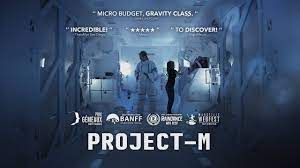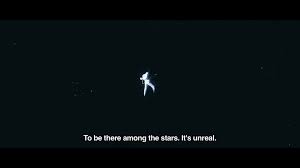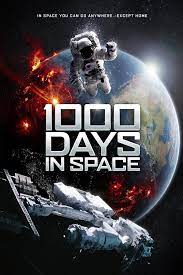Projet-M (2014) A 1000 Days in Space
IMDb meta-data is a runtime of 1 hour and 38 minutes, rated 4.7 by 403 cinematitizens.
Genre: Sy Fy, Species: Nuke and more.
DNA: Québécois
Verdict: A gripper with a double twist.
Tagline: Did we do that?

Four astronauts are aboard ‘M’ a vast spaceship in a low Earth orbit to test it and themselves for a mission to far Europa, a moon of Jupiter. Why Europa? Not for the Euros they may find there to fund a sequel but to find water since Earthlings have just about used all of theirs up. No, it doesn’t make a lot of sense but it is the kick-off.
The 1000 day mission is in Earth orbit, round and round, while they test all the equipment and endure each others’ company, bad jokes, personal hygiene, and airline food, though the catering was done in Québéc and therefore might be superior, well better than Qantas. In the opening moments we see them smoothly cooperate to avoid the scriptwriter’s old friend: meteors.
There follows some tedious backstories but not too much. It is a work of fiction and in it Québec is a major power and Montréal is the centre of the civilised world, or so one might infer from the absence of mention of any place else. Jeez, you’d think in the eternal north, Québec would have plenty of snow and ice for their drinks, but evidently it is all gone, leaving just the Polar bears. Tabernac!
Cynical viewers know something has to go wrong by 20 minutes, and it is does, but nothing that I expected. Indeed, for once I am hesitant to reveal what goes wrong, but it is necessary to make sense of the story.
There are some tensions among the crew – two men and two women – but their time is finishing, when…observing the Earth – well, Montréal – wrapped in a mantle of clouds from their orbit they see flames of light erupting through the obscurity like flares, a number of them. It is beautiful for an instant. Neither they nor the viewer realises what they are at first. These are the strikes of a nuclear war and in seconds, even as they scramble to make contact with the Flight Centre more and more erupt around the globe.
Now it becomes a study of individual and collective reactions to this singular event. They have no further communication with Earth and know no more and neither does the viewer. There are others in orbit and the first problem is whether to contact them, the Germans, the Russians…. In the absence of either orders or knowledge the Captain wants radio silence for the time being. This causes conflict with his three colleagues.

As the silence from the Earth extends for days and days, it is too much for one crew member who takes a one-way spacewalk. Captain Queeg himself beaks down but with a dose of Prozac later recovers. Bones, the medical officer, keeps her head while these two crack. It is she who decides to permit a Russian to dock and enter, partly in the hope of learning more information.
This Russki has been exposed to solar radiation and is dying, slowly, and he knows it but he knows nothing more than they do about the war below, but he does know something else that they do not know.
Again came another big surprise to this jaded know-it-all. Their scans of Europa, when subjected to secondary analysis on Earth, have revealed more than water, a lot more…. Could that discovery have been what triggered the nuclear war is a question that arises but is not developed in the narrative.
It is not often I get two whopping great surprises from a space opera but I got two here.
The film was prepared as a You Tube series but was converted into a feature in the hope of a commercial release. The acting by the two principal astronauts, Capn and Bones is superb, and the stage craft excellent, the more so when one reviewer estimates its cost was less than one day’s shooting in Hollywood.
On the acting, I have seen Capn before playing farces and comedies, to see him here, ramrod stiff and serious took me aback, rather like seeing rubber face Rowan Atkinson as the repressed Maigret. The fourth crewman, the science officer, was one of the scriptwriters.

